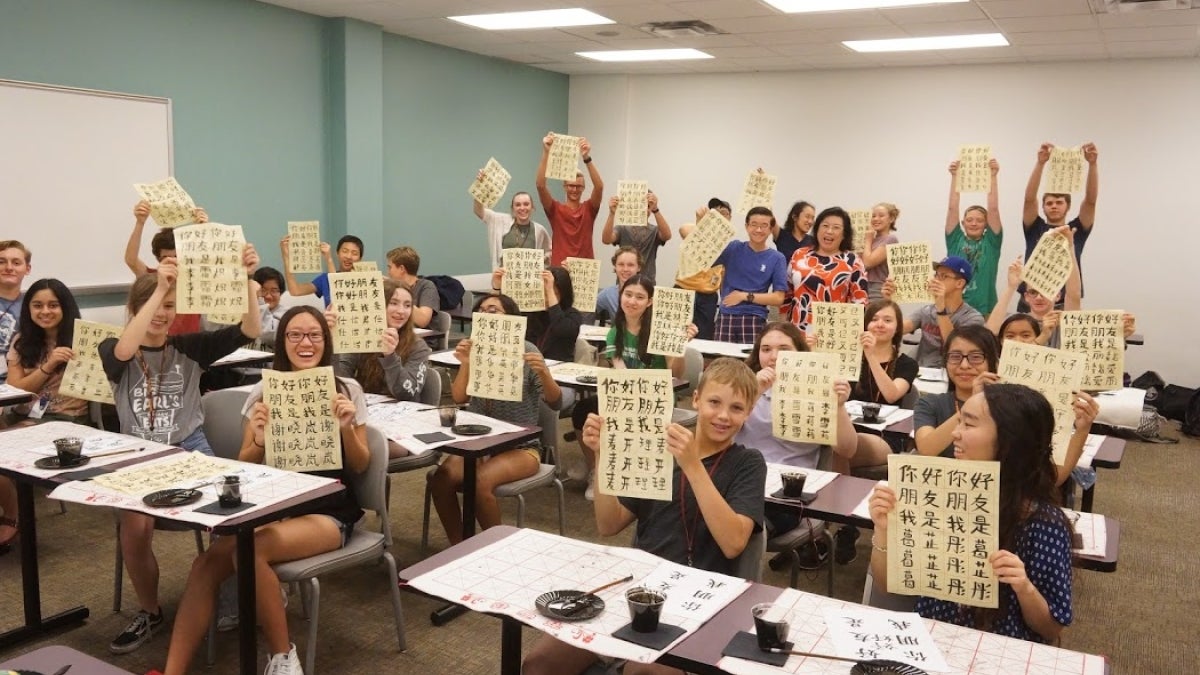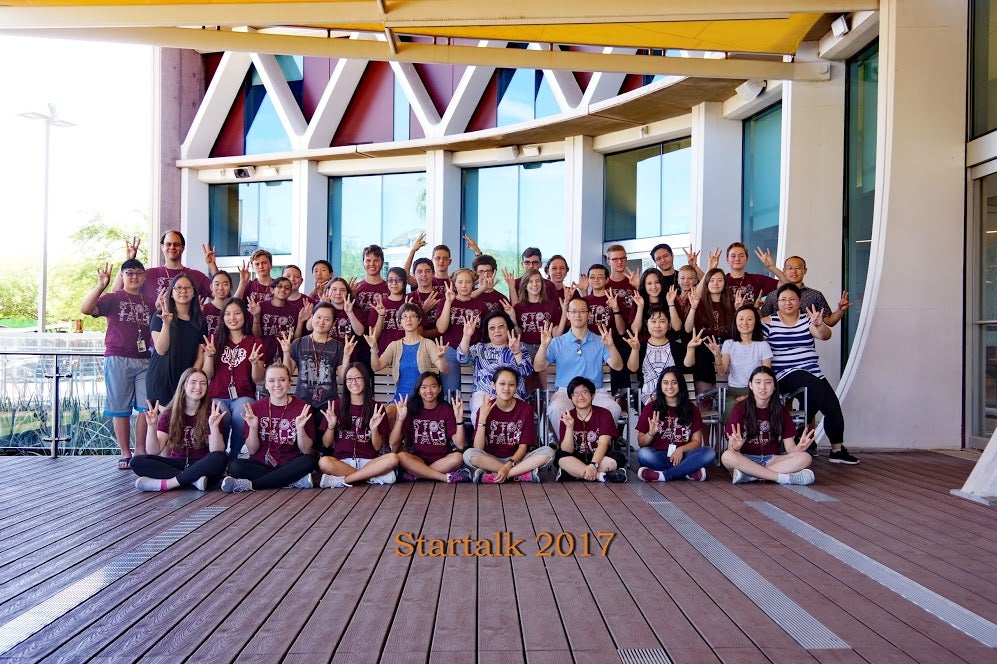ASU hosts Chinese Language Summer Camp for Arizona students

Participants pose with the fruits of their labor after practicing calligraphy during Startalk 2017.
On June 4, thirty middle and high school students arrived at Arizona State University to kick off the ninth annual ASU Startalk Chinese Language Summer Camp.
The camp marks an opportunity for Arizona’s brightest students to come together and develop their Chinese-language skills and cultural understanding. From the day they set foot on the ASU campus, students are immersed in the Chinese language and culture. Students remain at the camp twenty-four hours a day, sleeping in campus dormitories, eating with camp staff and other students, and engaging in full slate of daily activities. Lasting for a total of fifteen days, the camp offers a unique learning environment for its participants who came from nineteen schools in ten cities around the state,
The core activity of the camp is Chinese-language instruction. Students spend several hours a day in Chinese classes taught by experienced area instructors and teaching assistants. Classes, which range from the beginner to the intermediate level, are organized around a yearly camp theme. This year’s theme, “Let’s Plan a Family Reunion Trip to China,” places emphasis on giving students the ability to plan travel in Chinese-speaking countries. Students create a travel planner and carry out a variety of in-class activities and presentations based on the camp theme. Students also have individualized tutoring sessions with teaching assistants in the evenings.
Classes are conducted almost entirely in Chinese, forcing students to develop their listening and speaking skills. While full language immersion can be difficult for language learners of any age, learning alongside other highly-motivated students helps create a positive and cooperative educational environment for camp participants, and students note the improvement they make as the camp progresses. At the end of the camp, students create a poster and a slide show presentation advertising a vacation to one of their favorite Chinese cities.
Language instruction, however, is only the beginning of camp activities. Afternoons include hands-on cultural activities with topics such as dance, calligraphy and Chinese knots. Students also participate in evening activities such as Chinese movies and games, and are introduced to a variety of foods through Chinese lunches, a dumpling-making activity and a "fear factor" food-tasting game.
Guest instructors also join the camp to conduct cultural activities; for instance, a disciple of a Shaolin master visited campus this week to give a martial arts class for students. Through these activities, students gain exposure to different aspects of Chinese culture, while learning and practicing specialized Chinese vocabulary related to each activity.
Participants and staff of Startalk 2017 take a break during the intensive fifteen-day program.
One highlight of the week is an off-campus trip to Mekong Plaza in Mesa. After beginning the day with a dim sum brunch, students are sent on a scavenger hunt at the plaza supermarket. As with other camp activities, students must use their newly-acquired language skills to complete the activity, seeking out a list of Chinese foods and drinks from the variety of items on display at the market. The Mekong field trip gives students an opportunity to utilize their learning in the "real world."
On the last day of the camp, students celebrate and share their progress with friends, family and teachrs by putting on a performance. One aspect of the performance is the presentation of group projects on China’s major cities, done entirely by the students in Chinese. In addition, each does a song and dance number.
According to program director Xia Zhang, the camp is an enjoyable and valuable experience for students.
“This program strives to provide students with the best learning experience by immersing them in an intensive yet fun environment,” Zhang said. “I hope that through this program, students not only learn a foreign language but also learn to better appreciate another culture.”
After the camp concludes, students will use what they’ve learned as a springboard for further Chinese-language study at their respective schools and colleges. Apart from building their language skills and cultural understanding, students gain exposure to university campus life and build friendships with classmates that last beyond the camp.
Startalk is a presidential initiative funded by the National Security Agency that seeks to expand and improve the instruction and learning of strategically important languages such as Chinese. For the ninth consecutive year, the School of International Letters and Cultures at ASU was selected by the Startalk Central to host the Chinese Language Summer Camp. The camp is largely funded by the U.S. government, and students pay only a nominal fee to attend. Arizona students can apply to attend the camp in the spring of each year.
More information on the camp can be found at silc.clas.asu.edu/content/startalk-program or on the program Facebook page at facebook.com/asustartalk/.
More Arts, humanities and education

ASU instructor’s debut novel becomes a bestseller on Amazon
Desiree Prieto Groft’s newly released novel "Girl, Unemployed" focuses on women and work — a subject close to Groft’s heart.“I…

‘It all started at ASU’: Football player, theater alum makes the big screen
For filmmaker Ben Fritz, everything is about connection, relationships and overcoming expectations. “It’s about seeing…

Lost languages mean lost cultures
By Alyssa Arns and Kristen LaRue-SandlerWhat if your language disappeared?Over the span of human existence, civilizations have…


